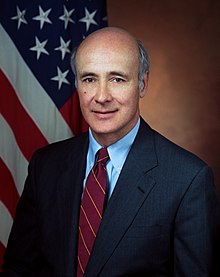Joseph Nye | |
|---|---|
 Official portrait, 1994 | |
| Assistant Secretary of Defense for International Security Affairs | |
| In office September 15, 1994 – December 16, 1995 | |
| President | Bill Clinton |
| Preceded by | Chas Freeman |
| Succeeded by | Franklin Kramer |
| Chair of the National Intelligence Council | |
| In office February 20, 1993 – September 15, 1994 | |
| President | Bill Clinton |
| Preceded by | Fritz Ermarth |
| Succeeded by | Christine Williams |
| Personal details | |
| Born | Joseph Samuel Nye Jr. January 19, 1937 South Orange, New Jersey, U.S. |
| Education | Princeton University (BA) Exeter College, Oxford (MA) Harvard University (PhD) |
Joseph Samuel Nye Jr. (born January 19, 1937) is an American political scientist. He and Robert Keohane co-founded the international relations theory of neoliberalism, which they developed in their 1977 book Power and Interdependence. Together with Keohane, he developed the concepts of asymmetrical and complex interdependence. They also explored transnational relations and world politics in an edited volume in the 1970s. More recently, he pioneered the theory of soft power. His notion of "smart power" ("the ability to combine hard and soft power into a successful strategy") became popular with the use of this phrase by members of the Clinton Administration and the Obama Administration.[1]
Nye is the former Dean of the John F. Kennedy School of Government at Harvard University, where he currently holds the position of University Distinguished Service Professor, Emeritus.[2] In October 2014, Secretary of State John Kerry appointed Nye to the Foreign Affairs Policy Board.[3] He is also a member of the Defense Policy Board.[4] He has been a Harvard faculty member since 1964. He is a fellow of the American Academy of Arts & Sciences, a foreign fellow of the British Academy, and a member of the American Academy of Diplomacy.[5]
The 2011 Teaching, Research, and International Policy (TRIP) survey of over 1,700 international relations scholars ranked Nye as the sixth most influential scholar in the field of international relations in the past 20 years.[6] He was also ranked as one of the most influential figures in American foreign policy. In 2011, Foreign Policy magazine included him on its list of top global thinkers.[7] In September 2014, Foreign Policy reported that international relations scholars and policymakers ranked Nye as one of the field's most influential scholars.[8]
- ^ Nye, Joseph (November 29, 2007). "Smart Power". The Huffington Post. Archived from the original on October 7, 2017. Retrieved March 23, 2021.
- ^ "Joseph Nye Faculty Page". Harvard Kennedy School Faculty Directory. Archived from the original on September 2, 2024. Retrieved July 20, 2018.
- ^ "Meeting of Secretary Kerry's Foreign Affairs Policy Board Secretary of State John Kerry Will Host a Meeting of the Foreign Affairs Policy Board on October 16". U.S. Department of State. October 16, 2014. Archived from the original on October 20, 2020. Retrieved May 25, 2019.
- ^ "DOD Announces New Defense Policy Board Members". U.S. Department of Defense. October 4, 2011. Archived from the original on October 20, 2013. Retrieved October 19, 2013.
- ^ "Membership List". The American Academy of Diplomacy. Archived from the original on September 28, 2013. Retrieved March 24, 2013.
- ^ "TRIP Around the World" (PDF). Archived from the original (PDF) on January 31, 2012.
- ^ Pavgi, Kedar (November 28, 2011). "The FP Top 100 Global Thinkers". Foreign Policy. Archived from the original on August 2, 2016. Retrieved February 23, 2020.
- ^ Ricks, Thomas E. (September 25, 2014). "Who are the top international-relations specialists? Surprise! Scholars have a very different view than policymakers do". Foreign Policy. Archived from the original on November 30, 2014. Retrieved July 11, 2017.